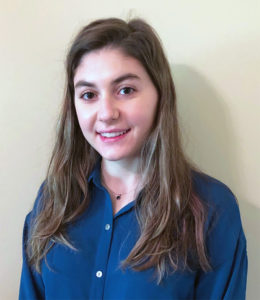At her first meeting with club leaders across the Tickle College of Engineering, Associate Dean Ozlem Kilic posed an important question: How, as the Volunteers, did UT not have an Engineers Without Borders chapter?

Ashley Goluoglu
As the president of Women in Nuclear, third-year nuclear engineering student Ashley Goluoglu was in attendance at Kilic’s meeting. When she heard this, she set out with true Volunteer spirit to bring EWB to campus.
The Engineers Without Borders-USA (EWB) mission is to build a better world through engineering projects that empower communities to meet their basic human needs and equip leaders to solve the world’s most pressing challenges.
Goluoglu’s father immigrated to the US from Turkey after receiving his first college degree, and she visits Turkey for about a month every year or every other year. Growing up with this experience has given her a valuable global perspective, and as an Engineering Vol, she sees the value engineers can bring to communities in need.
—Ashley Goluoglu
This underscores the values Goluoglu wants EWB’s members and operations to have. She explains that the club will only go places where members have a significant connection through someone who knows the culture, the area, the language, and the problems.
She also believes it is important for all club members to be mindful and self-aware.
“We need to recognize that these problems we talk about, like access to clean water or food or energy, are problems that occur right here in East Tennessee,” she said. “It’s important to not look down on any other community for problems we have in our own community.”
Goluoglu has always wanted to start her own club. Once she decided to bring EWB to UT, she took initiative to write the group’s constitution, project proposals, and report templates, building in efficiencies to serve the group for the long term.
Already, the proposals, complete with diagrams, budgets, and timelines, are helping to build the group’s reputation in the local community.
“I wanted this club to be mature and professional, so I wrote templates to give a sense of uniformity,” she said. “The proposals and reports help people we work with understand and support our goals as well as help future members follow previous projects and ideas.”
As a trial run, the group focused its first efforts in East Tennessee. The first two projects include a community-centered outdoor space at Vine Middle School and solar-powered charging station at KAT bus stops around Knoxville.
At Vine, they created an outdoor classroom, a sensory garden, rainwater collection system, and an aquaponics garden. The area will also be cleaned and painted with colorful educational murals.
They chose a garden at a school to have the most impact, since the surrounding community will be able to use it and replicate it, while students learn about life cycles and where food comes from.
With about 50 members from across all engineering disciplines, EWB is able to mobilize general engineering in the community.
—Ashley Goluoglu
For the bus stop project, the group considered the importance of having a phone to get and keep a job, and how vulnerable populations could use extra support for keeping a device charged.
Building charging stations into local KAT bus stops adds a convenience for people who rely on public transportation and who might not have the resources to keep up with charging a device at home, or who might even be homeless.
As the group grows, they are beginning to investigate possibilities for taking on new projects abroad.
Contact
Élan Young: elan@tennessee.edu